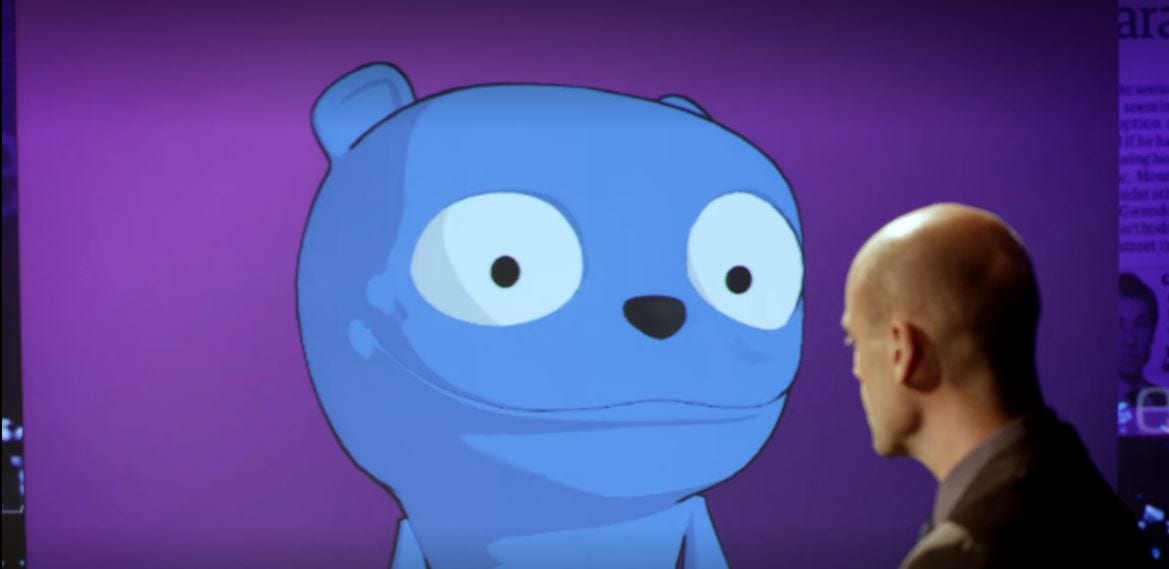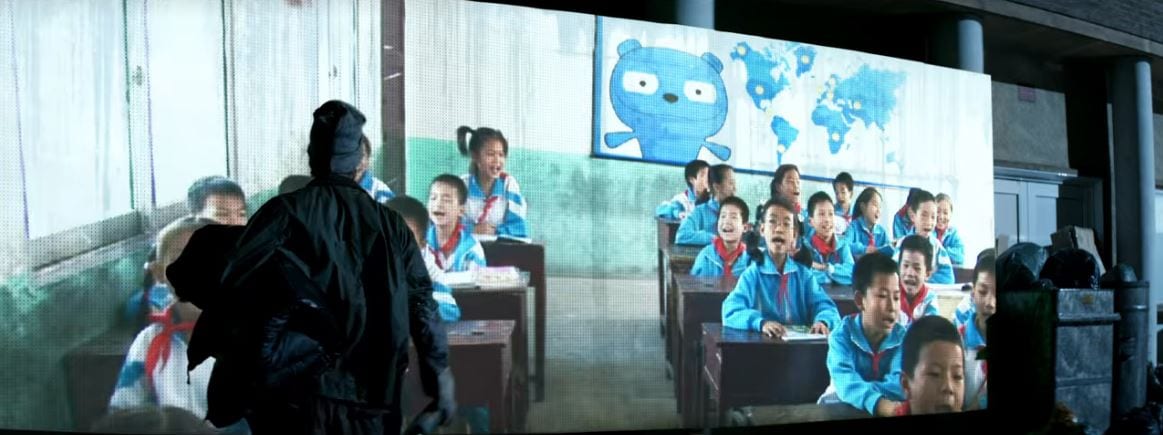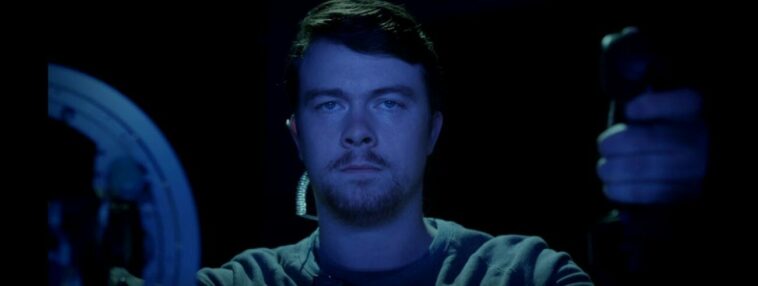If you haven’t seen Black Mirror, well, I’m not sure why you’re here. If you have, you know it is arguably one of the most important and thought provoking shows of our era. TV Obsessive is proud to feature analyses of each and every episode. Here, Caemeron Crain digs into Black Mirror S2E3, “The Waldo Moment.”
This is not science fiction.
Given that Black Mirror likes to at times play with ideas that are technically possible but haven’t happened, it should perhaps come as no surprise that in at least this one instance, reality has outstripped it. Watching “The Waldo Moment” in 2018 feels quite a bit different from the experience of watching it in 2013, for obvious reasons. Because, in reality, Waldo won.
The parallels to Trump are so direct it is not worth belaboring them, from the crass comments and insults hurled at political rivals, to even the most outlandish act of offering bystanders money for punching someone. It is not possible to watch this episode, or to think about it now, without thinking about Donald Trump’s rise to power.
But, rather than trying to use this work of fiction to try to score political points in reality, it is perhaps better to take it as an opportunity to think about questions that pertain to our political life in some separation from the fraught day-to-day of partisan bickering. And, so, let’s take a step back and think about the episode itself.
Our protagonist is a comedian named Jamie, who has not had the most successful career. He now voices, and animatronically manipulates the image of, a cartoon character named Waldo. In this first instance, this is as a segment of a broader program. Waldo’s schtick is to look like a character from a children’s show, but then to be a bit crass. Ali G comes to mind, insofar as Waldo’s first conversation with politician Liam Monroe seems to depend on Mr. Monroe not knowing what is going on, but frankly, Waldo is not nearly as funny.

Jamie is offered a Waldo pilot episode, but the brainstorming session to prepare for this quickly spins off into the idea of him further engaging with Monroe, who is running for a seat in parliament in a special election (after the previous holder resigned due to allegations of pedophilia—imagine that). Jamie’s producer, Jack, is particularly into the idea. And, so, off they go with a van to troll Mr. Monroe at a campaign event, even though Jamie himself protests that he isn’t into politics.
Waldo lobs some insults at Monroe, and finally gets him to engage. It is all rather juvenile, and culminates in a dick joke, but he has touched a nerve with people. Talk begins of running Waldo as a candidate in the election.
Jamie meets Gwendolyn, who is running against Monroe, and they hit it off. Sex happens. He asks for her number, and she gives it happily. But, once her campaign adviser learns of the interaction, she is cautioned against seeing Jamie again, for reasons that make sense.
That Jamie does not take it very well, though, as evidenced when he appears as Waldo at a debate forum related to the campaign. Monroe rips into him, and when he replies he rips into Gwendolyn as well, saying that she is even worse than Monroe is, because knows she can’t win the seat, and so on. The long and short is that Waldo claims both candidates are faker than he is—and he is a cartoon. The video of this goes viral.
It is easy enough to see the appeal of this kind of rant against the status quo. The approval ratings for the U.S. Congress have been below 20% for years, and frankly one wonders who those people are who do express a positive opinion. Already, back in 2000, Michael Moore ran a ficus tree for Congress. Brewster’s Millions (1985) featured Monty running a campaign for Mayor with the slogan “None of the Above.”
Clearly, the sentiment expressed by Waldo is one that connects with people; at least as a joke, or a protest. It also feeds into the “non-political” nature of someone like Jamie. Many individuals seem to be turned off by what passes for politics; they don’t vote, or pay much attention. A general distaste for, and distrust of, the establishment can be found on both sides of the political spectrum. Waldo represents the power of activating that, and a key part of that power lies in not actually having a substantive political vision. It’s just a matter of yelling, “I’m as mad as hell, and I’m not gonna take it anymore!”
1) Is a critique of the form of modern politics—lacking in substance—valid?
There is certainly something to the anger at establishment, or career politicians. All too often it seems that representatives are more interested in getting elected, or re-elected, than they are in serving the interests of the public. There are all sorts of issues pertaining to money in politics, corporate influence, and so on, and so forth. It is all too easy to then write all politicians off as equally bad, or to refuse to play the game of the lesser of two evils.
Yet, there is an aspect to that move that is as juvenile as Waldo. As Liam Monroe says, Waldo makes the whole system look absurd, “which it may well be; but it built these roads.”
If you want to refuse to play the established game, and instead kick over the board, you’ll need to have plan for what to replace it with. Otherwise, the plan seems to be to watch the world burn.
Jack suggests to Jamie that politicians may not be necessary at all. Every issue could be subject to an internet vote, and wouldn’t that be purer democracy? To which Jamie replies by pointing to the banality of the top video on YouTube. And, so, there is a deeper question raised:
2) Is democracy an end-in-itself? Is to be valued for its own sake? Or, is it better thought of as a tactic?

It would seem that the Enlightenment thinkers who pushed for democracy—the founding fathers of the U.S. among them—thought of it as more of a tactic than anything; a way to avoid tyranny and foster those Enlightenment ideals of reason and freedom. The raison d’etre of the Bill of Rights, for example, would seem to be protecting a minority from the potential tyranny of the masses.
As time has gone on, however, such a notion of the universal rights of human beings has waned in favor of a notion of democracy in line with neoliberalism. All arguments get reduced to expressions individual preference, and all values to a willingness to pay.
Jamie and Jack meet with a man named Jeff Carter, who is “from the agency,” to talk about Waldo’s future. Carter points to the fact that Waldo is a cartoon as a bonus—there is an inability to tie what he says to some particular person who could be tarnished—and presents the idea that Waldo could be perfect to deliver any brand of political content. He wants to roll him out worldwide.
This moment represents the Waldo phenomenon being co-opted by the political establishment, and so should be given its due weight. This is what will happen, as a matter of course, if one rants against the system in an inchoate way that connects with people, but without underlying substance. This is just asking to be viewed as marketing strategy to be used by those who have substantial interests. The rant against the system is incorporated into the system itself.
Waldo’s political critique is form with content, as is evident in the final scene, where Jamie—having disavowed Waldo, only to have the role taken over by Jack—sees his face everywhere, paired with messages about hope and change, for example.
This is a clear shot at Obama, and the way in which his 2008 campaign presented an empty surface for us to project upon. But, it is Trump who epitomizes “The Waldo Moment.” Waldo does not win the election in the episode—that felt like a bridge too far in 2013. But Trump won, and showed at the same time that you don’t need to be a cartoon to get the advantages Carter talked about; it is enough to be sufficiently cartoonish. It is enough to refuse to be pinned down on anything; to treat it all as a performance; to insist that nothing is more important than that foundational act of raising a middle finger at the status quo.
The notion of the truth as objective now faces its opposing moment: the truth defined in wholly subjective terms, as a matter of authenticity as opposed to factuality. One can only hope that Hegel’s view of history was right, and that these two opposing moments will ultimately be sublated. But, it is hard to be hopeful in a world where “The Waldo Moment” has happened.

